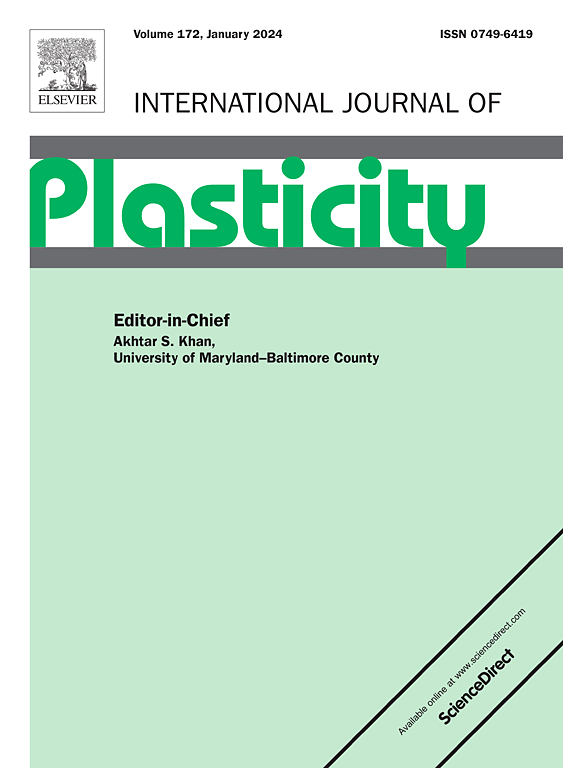纳米晶粒诱导马氏体钢高抗拉强度-塑性应变协同作用
IF 12.8
1区 材料科学
Q1 ENGINEERING, MECHANICAL
引用次数: 0
摘要
马氏体钢中δ -铁素体(δ)相的存在总是对塑性产生不利影响。本文提出了一种新的加工策略,采用连续的热轧、冷轧和低温退火,使含Fe-12Cr-11Ni-1.1Mo-1.7Ti-0.3Al-0.01C (wt.%)的马氏体钢的δ相几乎完全溶解。这种新型无δ马氏体钢主要由纳米级α′马氏体和高密度位错组成,与传统方法制备的含δ马氏体钢相比,塑性应变增加了约4倍(4.82±0.19%),而极限抗拉强度(1855±18 MPa)提高了约36.4%。在延迟应变下,纳米晶粒变形导致大量位错积累(即>;2%),有助于维持加工硬化能力,从而防止早期颈缩。这种机制允许更大的位错介导变形,使高密度位错在保持显著位错强化的同时表现出出色的塑化能力。本文章由计算机程序翻译,如有差异,请以英文原文为准。
Nano grains-induced high tensile strength-plastic strain synergy in martensitic steel
The plasticity is always detrimentally affected by the presence of the delta-ferrite (δ) phase in martensitic steels. This work presents a novel processing strategy employing successive warm-rolling, cold-rolling, and low-temperature annealing to achieve almost complete dissolution of the δ phase in a martensitic steel containing Fe-12Cr-11Ni-1.1Mo-1.7Ti-0.3Al-0.01C (in wt. %). This novel δ-free martensitic steel is primarily composed of nanoscale α′ martensite accompanied with high-density dislocations, demonstrating a ∼4-fold increase in plastic strain (4.82±0.19 %) while maintaining an enhancement of ∼36.4 % in ultimate tensile strength (1855±18 MPa) compared with its δ-containing counterpart fabricated via the conventional method. Nano-grains deformation induces a substantial dislocation accumulation at delayed strains (i.e., >2 %), contributing to a sustained work-hardening capacity and thus preventing early necking. This mechanism allows for greater dislocation-mediated deformation, enabling the high-density dislocations to exhibit an outstanding plasticizing capability while maintaining significant dislocation strengthening.
求助全文
通过发布文献求助,成功后即可免费获取论文全文。
去求助
来源期刊

International Journal of Plasticity
工程技术-材料科学:综合
CiteScore
15.30
自引率
26.50%
发文量
256
审稿时长
46 days
期刊介绍:
International Journal of Plasticity aims to present original research encompassing all facets of plastic deformation, damage, and fracture behavior in both isotropic and anisotropic solids. This includes exploring the thermodynamics of plasticity and fracture, continuum theory, and macroscopic as well as microscopic phenomena.
Topics of interest span the plastic behavior of single crystals and polycrystalline metals, ceramics, rocks, soils, composites, nanocrystalline and microelectronics materials, shape memory alloys, ferroelectric ceramics, thin films, and polymers. Additionally, the journal covers plasticity aspects of failure and fracture mechanics. Contributions involving significant experimental, numerical, or theoretical advancements that enhance the understanding of the plastic behavior of solids are particularly valued. Papers addressing the modeling of finite nonlinear elastic deformation, bearing similarities to the modeling of plastic deformation, are also welcomed.
 求助内容:
求助内容: 应助结果提醒方式:
应助结果提醒方式:


